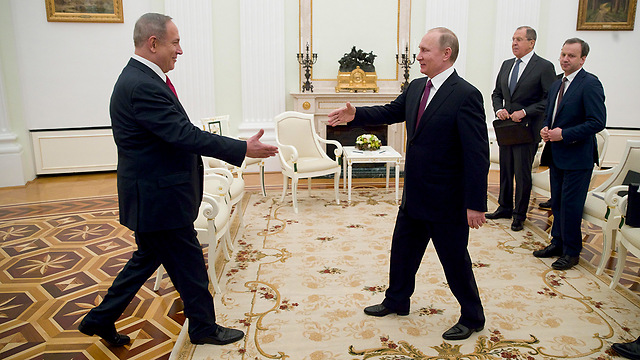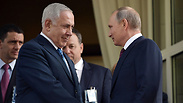
Netanyahu's message to Putin: Iranian hegemony also threatens you
Analysis: Netanyahu arrived at the Kremlin with the head of Military Intelligence, who explained to the Russian president the implications of Iran's activities in Lebanon and Syria: The establishment of factories in Lebanon that will turn Hezbollah's ‘stupid’ rockets into precision missiles, and eventually harm Russia's interests in the region.
Almost every time Vladimir Putin convenes a conference or a meeting on the future of Syria, Benjamin Netanyahu arrives days beforehand to talk with the Russian president. This was the case at the end of last year in Sochi, as it was during the prime minister's visit on Monday ahead of another conference aimed at reaching a political arrangement that will end the civil war in Syria, set to take place Tuesday.
This is the way in which there the silent agreement between Putin and Netanyahu is being handled, with Israel given the status of a non-present participant in discussions about the future of its northern neighbor.
It is legitimate to ask why Netanyahu needs to make the pilgrimage to the Kremlin whenever Russia initiates a move on Syria. After all, Putin is well aware of Israel's interests, headed by preventing Iranian entrenchment to its north and turning Syria into part of the northern front that Tehran is forming against the Jewish state.
The reason for this is that the reality on the ground—including the process of establishing Iran's foothold in Syria—is constantly changing. It is similar to a kaleidoscope in which each image displayed is unlike the previous one. This is the case in Syria and this time also in Lebanon.
The prime minister likely tried to convince Putin this time that an Iranian hegemony is not only threatening Israel, but seriously harms Russia's economic, security and political interests. All Moscow has achieved with its military involvement in Syria is now hangs in the balance and is threatened by Iran's moves, some of which are designed to usurp Russia to directly assert itself as the dominant and most influential force in Syria.
Netanyahu probably told Putin: "We have a common interest—not to allow Iran to send Iraqi Shi'ite militias to Syria, to build armament production factories and missile bases in Syria and Lebanon, and to be a partner with Syrian oil producing companies in its rich fields in the Deir ez-Zor district."
Avoid mentioning the nuclear agreement
Netanyahu will apparently refrain from trying to convince Putin to demand amendments to the nuclear agreement with Iran.
Despite the fact that Netanyahu told journalists that he discussed with the president the need to amend the nuclear deal, he knows that the matter is a lost cause and that Russia will not be persuaded to cooperate with moves by Israel and US President Donald Trump to limit Iran's missile program. The prime minister knows that on this matter, Putin will listen to him only with half an ear, because Russia has no interest in entering into a confrontation with Iran on this issue.

But Putin does not want Iran to destabilize the region, since that would risk damaging Russia's assets in Syria. That is why Netanyahu brought with him the head of Military Intelligence, Major-General Herzi Halevy, and not Mossad chief Yossi Cohen. Cohen is well acquainted with the issue, while Halevy is well versed in Iran's moves on the ground.
One of them is the attempt to establish a network of factories in Lebanon in which sophisticated navigation mechanisms will be installed in Hezbollah's "stupid" rockets which will turn them into missiles with heavy warheads and excellent precision-strike capabilities.
This effort is in its infancy, but it is estimated that Israel will not be able to let it develop, because it is the most serious threat it faces at the moment. Therefore, one can imagine that Netanyahu will tell Putin that if Iran does not stop building these industrial facilities for Hezbollah, Israel will consider destroying them even though they are on Lebanese soil.
An Israeli attack, Netanyahu pobably explained to Putin, will inevitably lead to an escalation in the north, and an ensuing war will almost certainly spill over into Syria as well. Assad will then demand that the Russians protect him, and this could lead to a clash that no one wants between Russia and Israel.
Fear of Shi'ite militias
A similar problem that could cause tension between Israel and Russia, and perhaps even cause a clash between their military forces, is the Shi'ite militias that Iran brings to Syria and Lebanon.
Here, too, Israel has set a red line whereby the consolidation of militias—mainly Iraqi and Syrian—near the Golan Heights or the Lebanese border, will draw an Israeli preventive action from which Russia will be indirectly harmed.
It is reasonable to assume that the intelligence chief pointed out to Putin that the Iranians have already begun to establish a land corridor between Tehran and Damascus and Beirut, via the al-Qa'im crossing and the city of Abu Kamal on the Syrian-Iraqi border.
Shi'ite militias from Iraq to Syria are already pouring through this land corridor, and their members already number 20,000. Most of them take part in the fighting alongside the Assad army in northern Syria, but they may soon reach Lebanese territory and the Israel-Lebanon border at the Golan Heights.
Hezbollah's political takeover of the Lebanese government and the entire country is also bad news, not only for Israel but also for Russia, as it destabilizes the region and threatens the strategic assets currently possessed by Russia in the eastern Mediterranean basin.
Netanyahu may stress to Putin that regardless of any future arrangement in Syria—Russia and Israel are in the same boat against Iran. They have the same interests that Russia should take into account, not as a favor for Israel but as a favor for itself. The head of Military Intelligence and the head of the National Security Council, Meir Ben-Shabat, was present to provide proof.
It is important to note that in contrast to the public statements made by Putin and his Foreign Affairs Minister Sergey Lavrov, Russia and Israel have a kind of unwritten agreement that the two countries maintain. The guiding principle of the current relationship between Russia and Israel is "Do not harm my interests, and I will not harm yours."



















